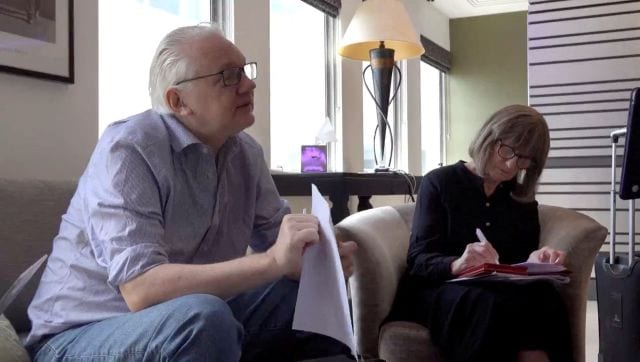WikiLeaks founder Julian Assange will be a relieved man today. The 52-year-old’s long-running legal saga over leaked documents comes to an end after he reached a plea deal with US prosecutors, which will now allow him to walk free after years of incarceration and confinement.
Shortly after the
deal
was revealed, Assange left London, making his way to Saipan, which is part of the Northern Mariana Islands, a US commonwealth north of Guam. He is expected to return to Australia after the court appearance on Wednesday morning.
Assange’s parents and wife expressed deep satisfaction over the turn of events with his mother, Christine Assange, saying: “I am grateful that my son’s ordeal is finally coming to an end. This shows the importance and power of quiet diplomacy.”
Assange’s father John Shipton thanked the Australian government. “It looks as though Julian will be free to come back to Australia. My thanks and congratulations to all his supporters… that have made that possible, and of course, the Prime Minister, Anthony Albanese,” he told ABC News.
He also added, “I don’t fade easily, you know. And neither does Julian. It must be a family trait.”
We take a closer look at what was the case that Assange was embroiled in and how he struck a deal with the US for his freedom.
What was the case against Julian Assange?
Assange
, an Australian editor and publisher, gained notoriety in 2010 when his organisation, WikiLeaks, released almost half a million documents relating to the US wars in Iraq and Afghanistan. According to the US government, he conspired with Chelsea Manning, a military intelligence analyst, to use his WikiLeaks website to disclose tens of thousands of reports, which exposed the US military misconduct in foreign countries.
The Trump administration then charged him with endangering national security and of conspiring together to crack a Defence Department password. John Demers, the then top Justice Department national security official had said at the time: “Julian Assange is no journalist. No responsible actor, journalist or otherwise, would purposely publish the names of individuals he or she knew to be confidential human sources in war zones, exposing them to the gravest of dangers.”
So, why wasn’t he arrested then and imprisoned?
Until now,
Assange
has been in the high-security Belmarsh Prison on the outskirts of London for five years, fighting US extradition efforts to be transferred across the Atlantic. Prior to that, he was in the Ecuadorian Embassy in London, fighting an investigation by Swedish authorities on claims of sexual misconduct. That investigation was later dropped.
At the Belmarsh prison, Assange was confined to a cell for 23 hours a day, eating his meals off a tray alone, surrounded by 232 books and allowed only an hour a day for exercise in a prison yard, according to an account published in The Nation this year.
What’s the deal now?
Now, after years and years of fending off attempts to be extradited to the US and stand trial, Assange has managed to strike a deal with authorities that will grant him freedom. How?
The 52-year-old WikiLeaks founder will have to plead guilty to the felony charge under the Espionage Act of conspiring to unlawfully obtain and disseminate classified information relating to the national defense of the United States, according to a Justice Department letter filed in federal court.
As part of the deal then, he will be sentenced to 62 months, which corresponds to the time he has already served in UK prisons.
The guilty plea has to be approved by a judge for which Assange is now travelling to Saipan — capital of the Mariana islands a US commonwealth in the Western Pacific.
The case is being heard here as Assange had earlier refused proceedings in the US and also the area’s proximity to his home in Australia.
While the turn of events may be surprising for many, as the New York Times reports, it wasn’t completely unexpected. Australian politicians have been lobbying for his release. In fact, last October, Australia’s Anthony Albanese had raised the issue on a visit to the White House, saying “enough was enough – it’s time it was brought to a conclusion”.
US president Joe Biden had also said he was considering a request from Australia to drop the US push to prosecute Assange.
After his court appearance in Saipan, Assange is expected to return to Australia. The same has been confirmed by WikiLeaks.
How has the world reacted?
Assange’s parents and wife are overjoyed that the 14-year-long saga comes to an end. Stella, the wife, thanked his supporters for their years of advocacy. “Words cannot express our immense gratitude to YOU- yes YOU, who have all mobilised for years and years to make this come true. THANK YOU. THANK YOU. THANK YOU,” she said in a post on X.
However, while supporters and friends celebrate Assange’s release, there are others who aren’t happy. Former US vice president Mike Pence, called the plea deal, as per The Guardian, as a “miscarriage of justice” which “dishonours” US troops.
He wrote on X: “Julian Assange endangered the lives of our troops in a time of war and should have been prosecuted to the fullest extent of the law. The Biden administration’s plea deal with Assange is a miscarriage of justice and dishonours the service and sacrifice of the men and women of our Armed Forces and their families. There should be no plea deals to avoid prison for anyone that endangers the security of our military or the national security of the United States. Ever.”
On the other hand, Independent presidential candidate Robert F Kennedy Jr hailed Assange’s release, calling him a generational hero. He, however, pointed out that by agreeing to a guilty plea, “the US security state succeeded in criminalising journalism and extending their jurisdiction globally to non-citizens.”
With inputs from agencies
This post was originally published on this site be sure to check out more of their content.









